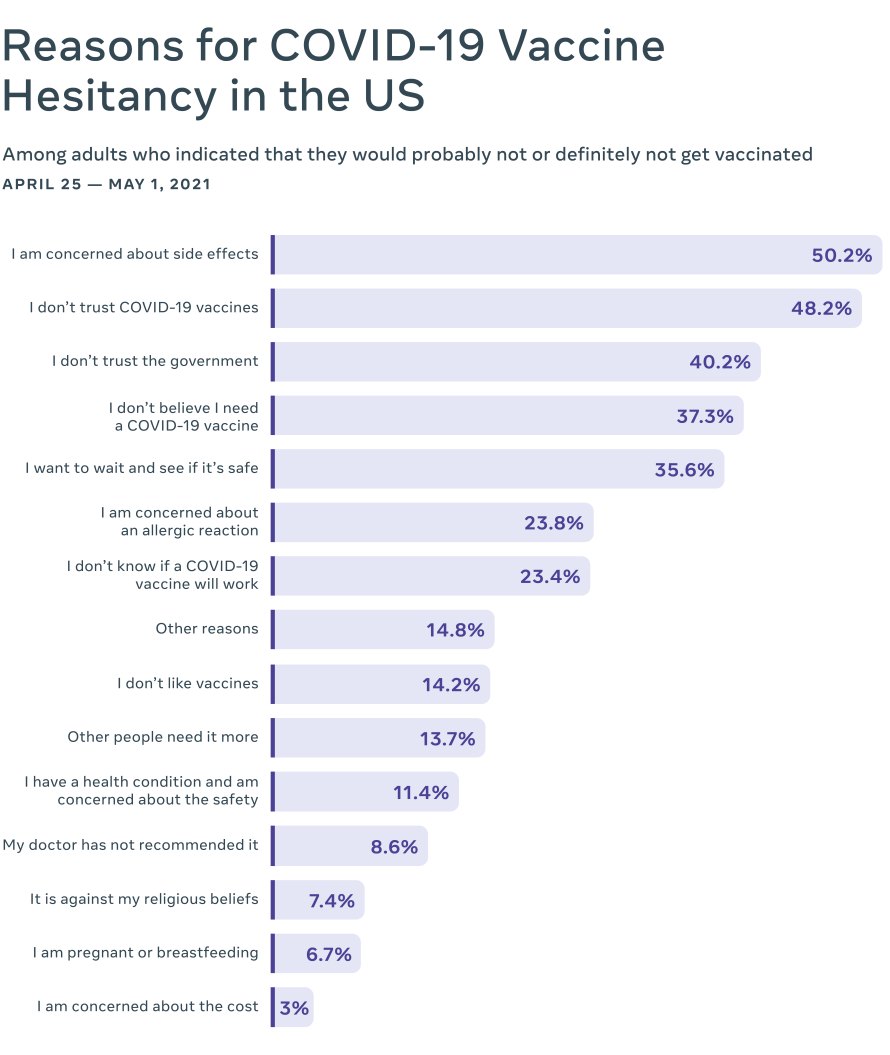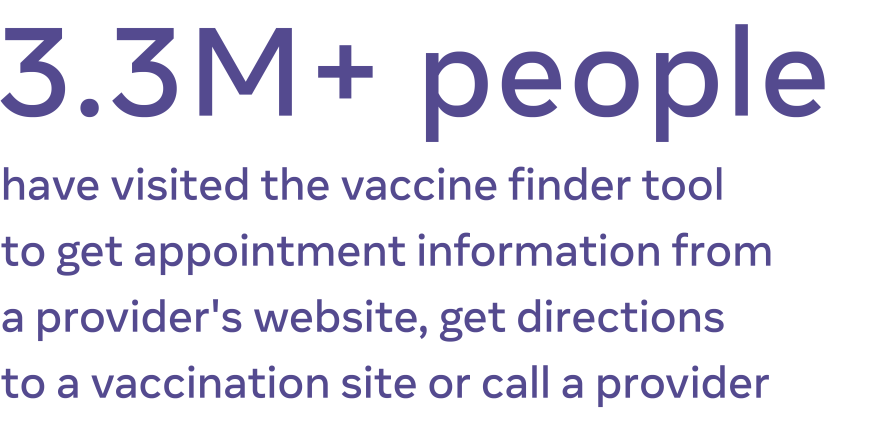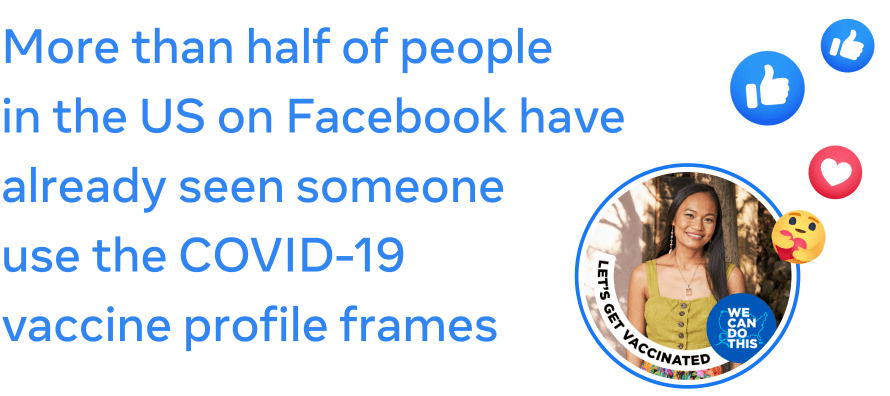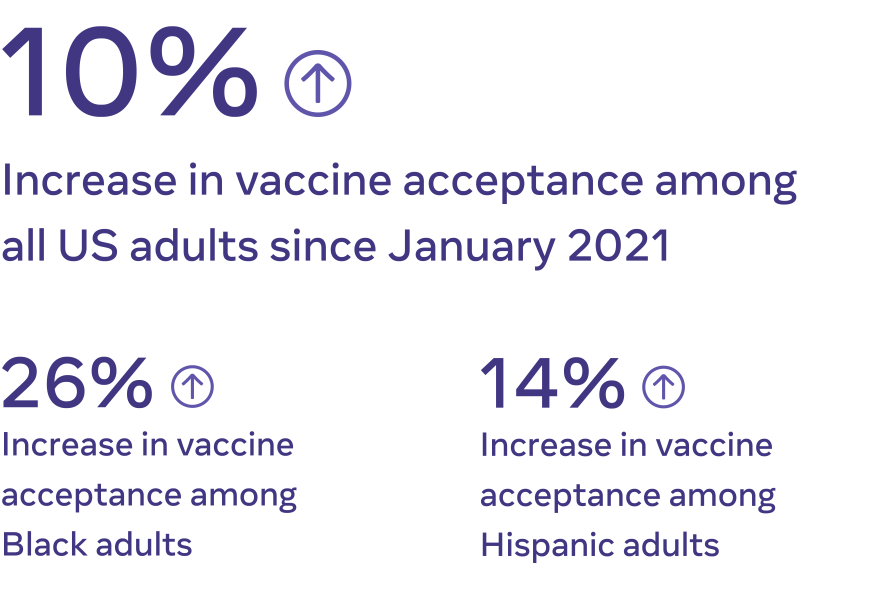Last week, President Biden set a goal for 70% of adults in the US to get at least one vaccine shot and 160 million Americans to be fully vaccinated against COVID-19 by July 4. At Facebook, we’re working to help meet this goal by improving access to information about vaccines and how to get vaccinated, making it easier for people to share their support for vaccines, and reducing misinformation about vaccines. Today, we are sharing an update on our global vaccination work as well as recent trends in vaccine acceptance from the COVID-19 Symptom Survey that we hope will help inform efforts to reach those around the world who have not yet been vaccinated.
Supporting Vaccination Efforts on our Apps
Helping people find when and where they can get vaccinated: In the US, we’re working with Boston Children’s Hospital to help people book vaccine appointments in just a few taps by connecting them with local vaccination sites. Over 3.3 million people have visited the vaccine finder tool since its launch on March 11, using it to get appointment information from a provider’s website, get directions to a provider or call a provider. In addition, we’re showing people reliable information about whether and when they’re eligible to get vaccinated through News Feed promotions and our COVID-19 Information Center. Showing people this information in News Feed is having a positive impact on vaccine registrations. For example, West Virginia’s Department of Health and Human Resources reported that their vaccine registrations increased significantly after Facebook started running these notifications.
Connecting people to reliable information about COVID-19 vaccines: Since January, we’ve given more than $30 million in ad credits to help governments, NGOs and other organizations reach people with COVID-19 vaccine information and other important messages. These information campaigns resulted in an estimated 10 billion ad impressions globally. We’re also adding authoritative information to posts about vaccines on Facebook and Instagram that link to the COVID-19 Information Center for more resources.
Encouraging people to share their support for vaccines: We know from public health research that people are more likely to get vaccinated if they see others in their community doing so. In countries where vaccines are available to most of the population, like the US and the UK, we ramped up our efforts to show people when their friends and neighbors share their support for vaccines through profile frames and stickers. More than 5 million people globally have used these profile frames. And more than 50% of people in the US on Facebook have already seen someone use the COVID-19 vaccine profile frames, which we developed in collaboration with the US Department of Health and Human Services and Centers for Disease Control and Prevention. On Instagram, we also introduced stickers for people to share that they got vaccinated or share their support for vaccines. Since April, these have been used more than 7 million times, and more than 25% of accounts on Instagram in the US have seen someone use a COVID-19 vaccine sticker.
Addressing content that could discourage people from getting vaccinated: An important part of our work to increase vaccinations is to address content that violates our rules on COVID-19 and vaccine misinformation. Over the course of the pandemic, we have removed more than 16 million pieces of this content from our apps for breaking our rules on COVID-19 and vaccine misinformation. For certain content that does not break these rules, but could still discourage someone from getting vaccinated, we reduce its distribution on Facebook and remove it from recommendations on Facebook and Instagram.
Real-Time Insights on Vaccine Acceptance and Drivers of Vaccine Hesitancy
Since April 2020, we’ve been collaborating with Carnegie Mellon University and University of Maryland on a global survey to gather insights about COVID-19 symptoms, testing, vaccination rates and more. This is the largest survey of its kind, with over 60 million total responses, and more than 170,000 responses daily across more than 200 countries and territories. This effort generates localized insights for researchers, public health officials and policymakers who are working to end the pandemic as quickly as possible. Today, we’re sharing some recent insights from this survey related to trends in vaccine acceptance. Globally, we’ve seen vaccine acceptance rising — for example it increased 18% in Chile and 4% in the UK since January. And in the US:
- Vaccine acceptance has been increasing steadily since January, increasing nearly 10% among all US adults.
- We observed a particularly large increase in vaccine acceptance within certain populations in the US. Vaccine acceptance increased 26% among Black adults and 14% among Hispanic adults.
- Vaccine access also remains a challenge. In April, among adults who intend to get vaccinated (but have not yet), 36% felt uninformed about how to get a vaccine and only 22% reported that they have an appointment.
Adults who are hesitant about getting a COVID-19 vaccine indicate they are most hesitant due to concerns about side effects, followed by distrust of COVID-19 vaccines and the government. Most respondents who are hesitant due to concerns about side effects indicate they would be most persuaded by those within their community, either healthcare providers who they know or friends and family. Combating hesitancy will require ongoing work to address these specific concerns. We’re continuing to share these insights with public officials, nonprofits and others to help inform more effective vaccination efforts.

While we’re encouraged by the positive trends in surveys about vaccine acceptance and the work that we and our partners have done so far, the data also demonstrates the need to continue efforts to reach the remaining populations with lower vaccine acceptance. For more information about our global efforts, see how we’re reaching billions of people with COVID-19 vaccine information. You can also see additional insights from the COVID-19 Symptom Survey.

























